Personal Leadership Development: Reflection on Key Leadership Concepts
VerifiedAdded on 2023/06/07
|13
|3113
|116
Essay
AI Summary
This essay is a personal reflection on various leadership concepts and theories learned throughout a leadership module, including democratic leadership, substitutes for leadership, emotional intelligence, servant leadership, intrinsic and extrinsic rewards, communication, and diversity. The author reflects on how these concepts have impacted their understanding of leadership and how they plan to apply them to their personal leadership development. The essay discusses the importance of self-awareness, managing emotions, social awareness, and relationship management in effective leadership. It also covers the advantages and disadvantages of different leadership styles and the importance of understanding and motivating employees through both intrinsic and extrinsic rewards.
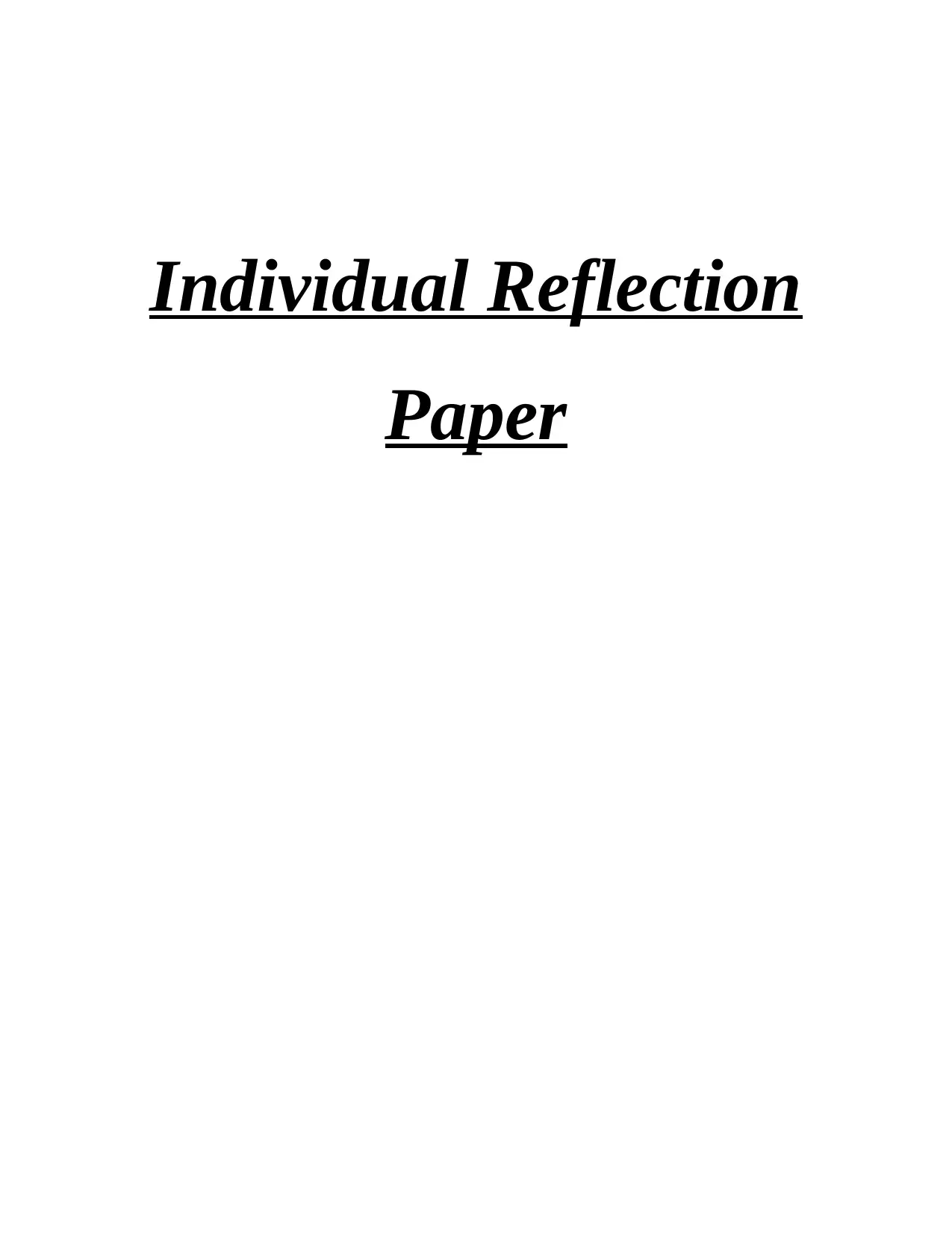
Individual Reflection
Paper
Paper
Paraphrase This Document
Need a fresh take? Get an instant paraphrase of this document with our AI Paraphraser
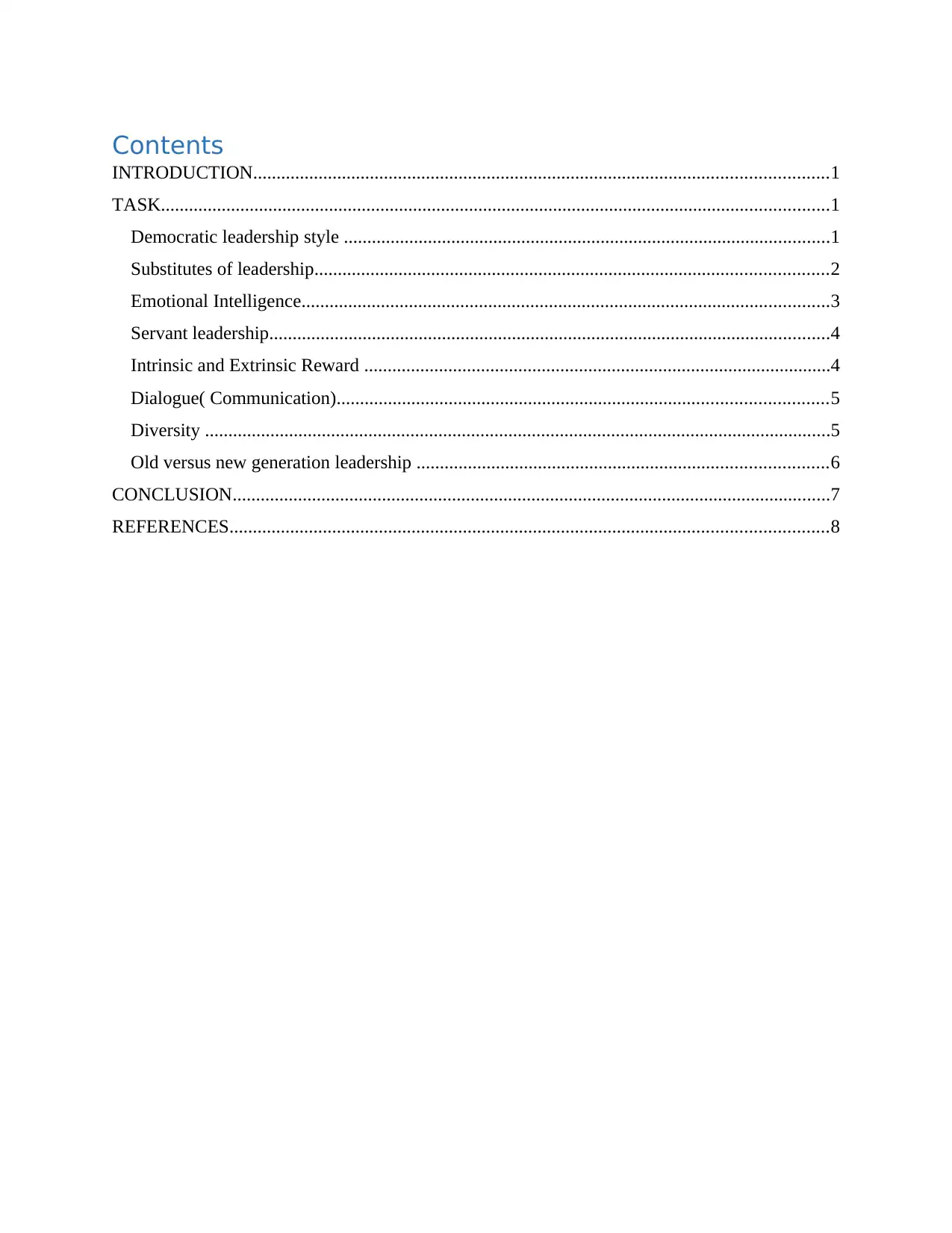
Contents
INTRODUCTION...........................................................................................................................1
TASK...............................................................................................................................................1
Democratic leadership style ........................................................................................................1
Substitutes of leadership..............................................................................................................2
Emotional Intelligence.................................................................................................................3
Servant leadership........................................................................................................................4
Intrinsic and Extrinsic Reward ....................................................................................................4
Dialogue( Communication).........................................................................................................5
Diversity ......................................................................................................................................5
Old versus new generation leadership ........................................................................................6
CONCLUSION................................................................................................................................7
REFERENCES................................................................................................................................8
INTRODUCTION...........................................................................................................................1
TASK...............................................................................................................................................1
Democratic leadership style ........................................................................................................1
Substitutes of leadership..............................................................................................................2
Emotional Intelligence.................................................................................................................3
Servant leadership........................................................................................................................4
Intrinsic and Extrinsic Reward ....................................................................................................4
Dialogue( Communication).........................................................................................................5
Diversity ......................................................................................................................................5
Old versus new generation leadership ........................................................................................6
CONCLUSION................................................................................................................................7
REFERENCES................................................................................................................................8
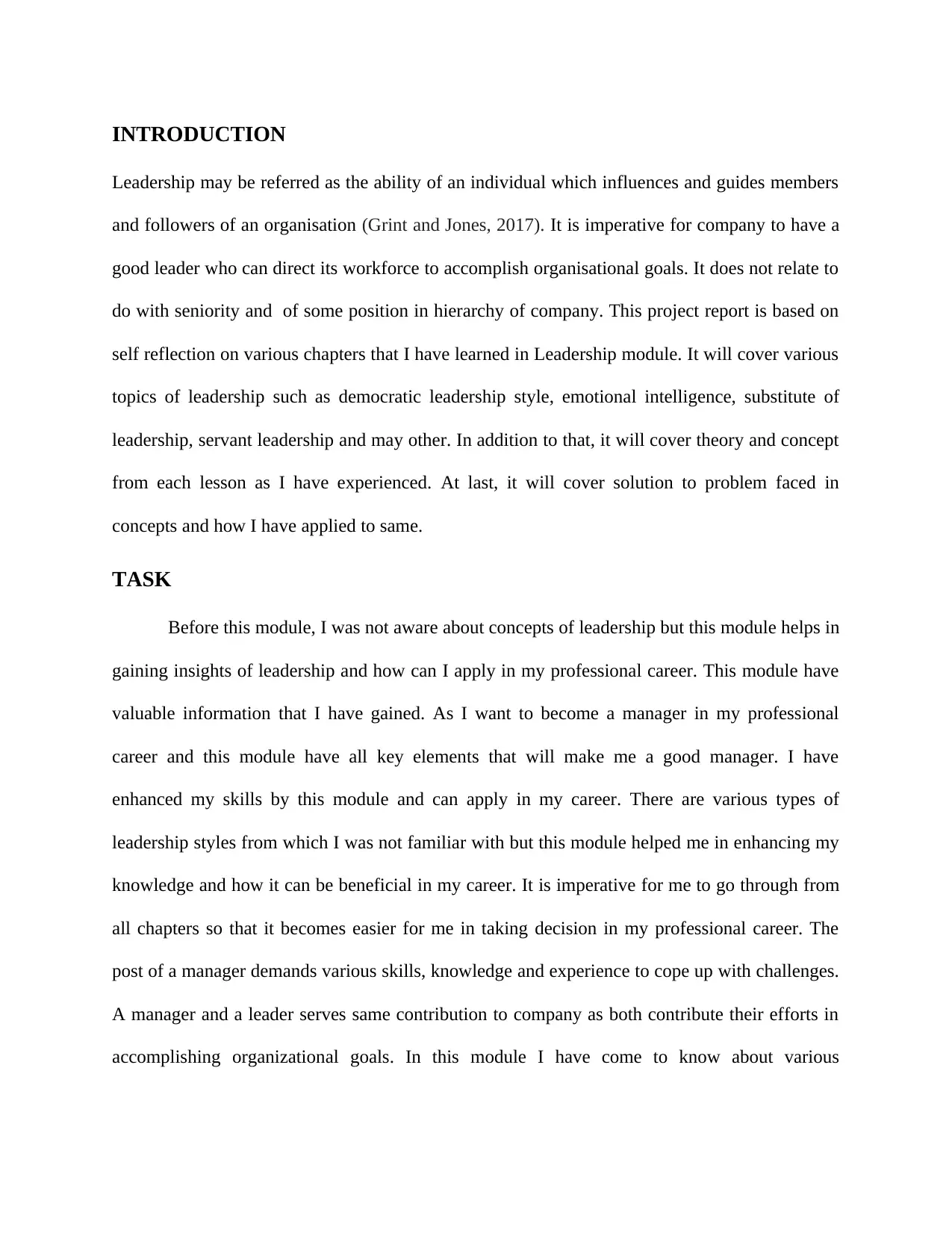
INTRODUCTION
Leadership may be referred as the ability of an individual which influences and guides members
and followers of an organisation (Grint and Jones, 2017). It is imperative for company to have a
good leader who can direct its workforce to accomplish organisational goals. It does not relate to
do with seniority and of some position in hierarchy of company. This project report is based on
self reflection on various chapters that I have learned in Leadership module. It will cover various
topics of leadership such as democratic leadership style, emotional intelligence, substitute of
leadership, servant leadership and may other. In addition to that, it will cover theory and concept
from each lesson as I have experienced. At last, it will cover solution to problem faced in
concepts and how I have applied to same.
TASK
Before this module, I was not aware about concepts of leadership but this module helps in
gaining insights of leadership and how can I apply in my professional career. This module have
valuable information that I have gained. As I want to become a manager in my professional
career and this module have all key elements that will make me a good manager. I have
enhanced my skills by this module and can apply in my career. There are various types of
leadership styles from which I was not familiar with but this module helped me in enhancing my
knowledge and how it can be beneficial in my career. It is imperative for me to go through from
all chapters so that it becomes easier for me in taking decision in my professional career. The
post of a manager demands various skills, knowledge and experience to cope up with challenges.
A manager and a leader serves same contribution to company as both contribute their efforts in
accomplishing organizational goals. In this module I have come to know about various
Leadership may be referred as the ability of an individual which influences and guides members
and followers of an organisation (Grint and Jones, 2017). It is imperative for company to have a
good leader who can direct its workforce to accomplish organisational goals. It does not relate to
do with seniority and of some position in hierarchy of company. This project report is based on
self reflection on various chapters that I have learned in Leadership module. It will cover various
topics of leadership such as democratic leadership style, emotional intelligence, substitute of
leadership, servant leadership and may other. In addition to that, it will cover theory and concept
from each lesson as I have experienced. At last, it will cover solution to problem faced in
concepts and how I have applied to same.
TASK
Before this module, I was not aware about concepts of leadership but this module helps in
gaining insights of leadership and how can I apply in my professional career. This module have
valuable information that I have gained. As I want to become a manager in my professional
career and this module have all key elements that will make me a good manager. I have
enhanced my skills by this module and can apply in my career. There are various types of
leadership styles from which I was not familiar with but this module helped me in enhancing my
knowledge and how it can be beneficial in my career. It is imperative for me to go through from
all chapters so that it becomes easier for me in taking decision in my professional career. The
post of a manager demands various skills, knowledge and experience to cope up with challenges.
A manager and a leader serves same contribution to company as both contribute their efforts in
accomplishing organizational goals. In this module I have come to know about various
⊘ This is a preview!⊘
Do you want full access?
Subscribe today to unlock all pages.

Trusted by 1+ million students worldwide
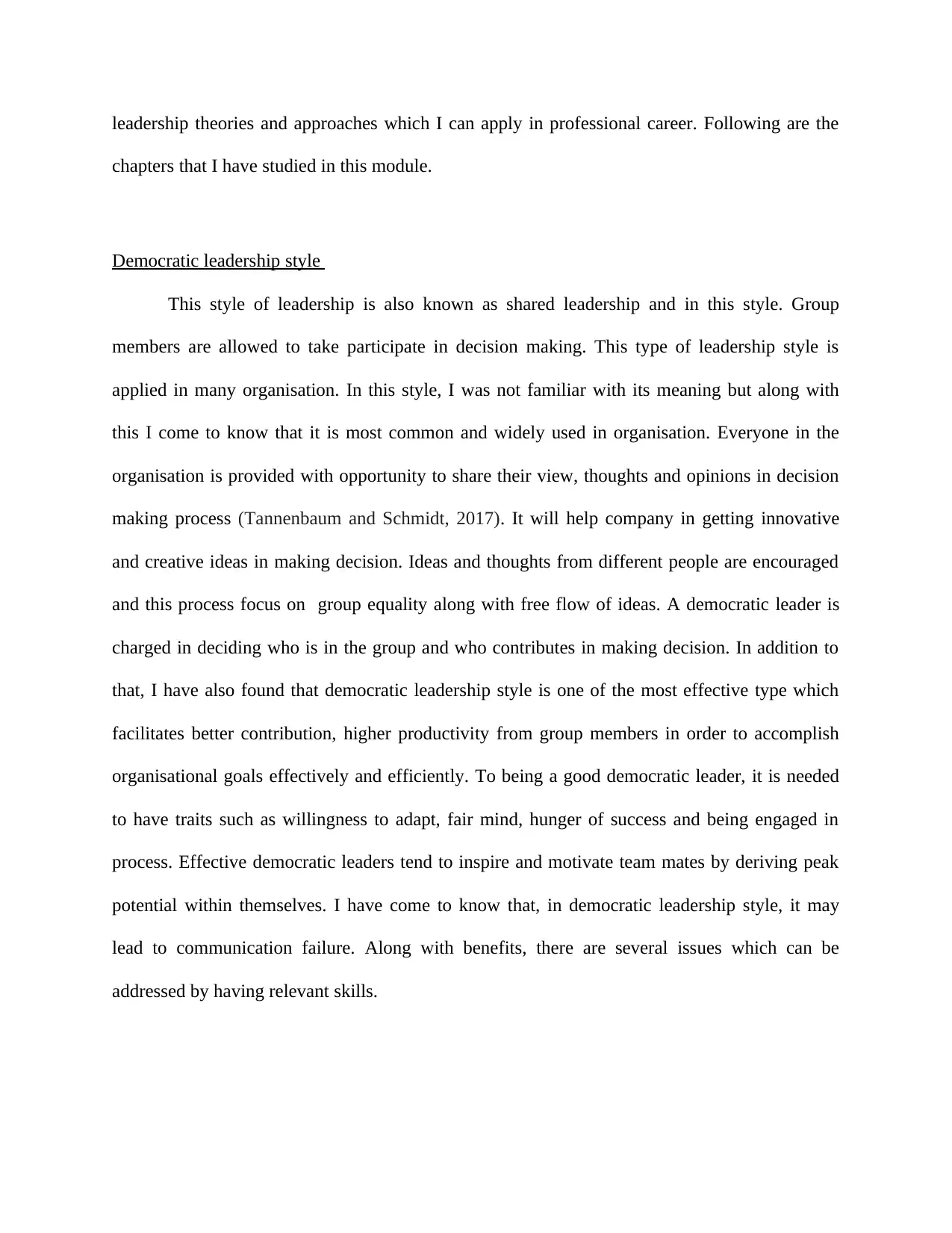
leadership theories and approaches which I can apply in professional career. Following are the
chapters that I have studied in this module.
Democratic leadership style
This style of leadership is also known as shared leadership and in this style. Group
members are allowed to take participate in decision making. This type of leadership style is
applied in many organisation. In this style, I was not familiar with its meaning but along with
this I come to know that it is most common and widely used in organisation. Everyone in the
organisation is provided with opportunity to share their view, thoughts and opinions in decision
making process (Tannenbaum and Schmidt, 2017). It will help company in getting innovative
and creative ideas in making decision. Ideas and thoughts from different people are encouraged
and this process focus on group equality along with free flow of ideas. A democratic leader is
charged in deciding who is in the group and who contributes in making decision. In addition to
that, I have also found that democratic leadership style is one of the most effective type which
facilitates better contribution, higher productivity from group members in order to accomplish
organisational goals effectively and efficiently. To being a good democratic leader, it is needed
to have traits such as willingness to adapt, fair mind, hunger of success and being engaged in
process. Effective democratic leaders tend to inspire and motivate team mates by deriving peak
potential within themselves. I have come to know that, in democratic leadership style, it may
lead to communication failure. Along with benefits, there are several issues which can be
addressed by having relevant skills.
chapters that I have studied in this module.
Democratic leadership style
This style of leadership is also known as shared leadership and in this style. Group
members are allowed to take participate in decision making. This type of leadership style is
applied in many organisation. In this style, I was not familiar with its meaning but along with
this I come to know that it is most common and widely used in organisation. Everyone in the
organisation is provided with opportunity to share their view, thoughts and opinions in decision
making process (Tannenbaum and Schmidt, 2017). It will help company in getting innovative
and creative ideas in making decision. Ideas and thoughts from different people are encouraged
and this process focus on group equality along with free flow of ideas. A democratic leader is
charged in deciding who is in the group and who contributes in making decision. In addition to
that, I have also found that democratic leadership style is one of the most effective type which
facilitates better contribution, higher productivity from group members in order to accomplish
organisational goals effectively and efficiently. To being a good democratic leader, it is needed
to have traits such as willingness to adapt, fair mind, hunger of success and being engaged in
process. Effective democratic leaders tend to inspire and motivate team mates by deriving peak
potential within themselves. I have come to know that, in democratic leadership style, it may
lead to communication failure. Along with benefits, there are several issues which can be
addressed by having relevant skills.
Paraphrase This Document
Need a fresh take? Get an instant paraphrase of this document with our AI Paraphraser

Substitutes of leadership
Before reading this chapter, I do not know that there would be substitute of leadership.
But this module helped me in gaining relevant information about substitute of leadership theory.
This theory was first developed by John and Steven Kerr an was published in 1978 in
Organisation Behaviour and Human Performance (Heyler and Martin, 2018). This theory states
that various situational factors can neutralize, enhance or substitute for leader behaviour.
Following are some elements of substitute for leadership theory.
Substitutes – It may be referred as the variables which makes leadership unnecessary for
subordinates along with reduce extent to which team mates rely on their leader.
Formulation of cohesive work groups tends to less depend on leader.
Enhancers -They are defined as the variables which serve to strengthen leaders influence
on the outcomes of subordinates. Subordinates having experience can able to translate
most ambiguous instructions into results.
Neutralizers -In this chapter, I have come to know that neutralizers are the variables
which serve to weaken or restricts leaders influence on outcomes of subordinates.
Emotional Intelligence
In this chapter, I have come to know about various concepts of emotional intelligence and
how it can contribute in making team more productive. It may be referred as the ability to
manage and understand emotions along with influencing and recognizing emotions around an
individual. I have gained knowledge about how emotional intelligence can affect in decision
making and in behaviour. There are four components of emotional intelligence that I have
studied in this chapter. The four components of emotional intelligence are discussed below.
Before reading this chapter, I do not know that there would be substitute of leadership.
But this module helped me in gaining relevant information about substitute of leadership theory.
This theory was first developed by John and Steven Kerr an was published in 1978 in
Organisation Behaviour and Human Performance (Heyler and Martin, 2018). This theory states
that various situational factors can neutralize, enhance or substitute for leader behaviour.
Following are some elements of substitute for leadership theory.
Substitutes – It may be referred as the variables which makes leadership unnecessary for
subordinates along with reduce extent to which team mates rely on their leader.
Formulation of cohesive work groups tends to less depend on leader.
Enhancers -They are defined as the variables which serve to strengthen leaders influence
on the outcomes of subordinates. Subordinates having experience can able to translate
most ambiguous instructions into results.
Neutralizers -In this chapter, I have come to know that neutralizers are the variables
which serve to weaken or restricts leaders influence on outcomes of subordinates.
Emotional Intelligence
In this chapter, I have come to know about various concepts of emotional intelligence and
how it can contribute in making team more productive. It may be referred as the ability to
manage and understand emotions along with influencing and recognizing emotions around an
individual. I have gained knowledge about how emotional intelligence can affect in decision
making and in behaviour. There are four components of emotional intelligence that I have
studied in this chapter. The four components of emotional intelligence are discussed below.
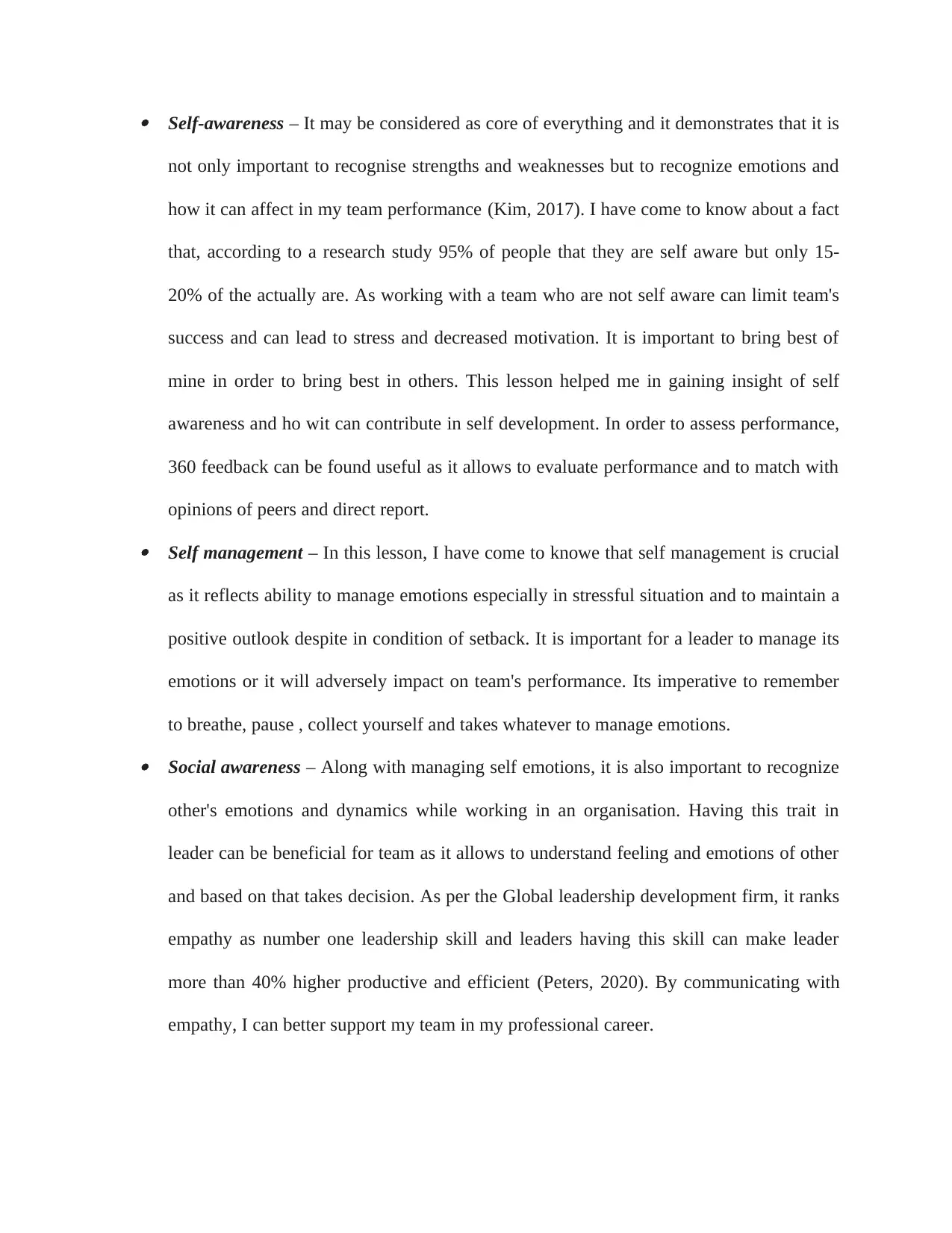
Self-awareness – It may be considered as core of everything and it demonstrates that it is
not only important to recognise strengths and weaknesses but to recognize emotions and
how it can affect in my team performance (Kim, 2017). I have come to know about a fact
that, according to a research study 95% of people that they are self aware but only 15-
20% of the actually are. As working with a team who are not self aware can limit team's
success and can lead to stress and decreased motivation. It is important to bring best of
mine in order to bring best in others. This lesson helped me in gaining insight of self
awareness and ho wit can contribute in self development. In order to assess performance,
360 feedback can be found useful as it allows to evaluate performance and to match with
opinions of peers and direct report. Self management – In this lesson, I have come to knowe that self management is crucial
as it reflects ability to manage emotions especially in stressful situation and to maintain a
positive outlook despite in condition of setback. It is important for a leader to manage its
emotions or it will adversely impact on team's performance. Its imperative to remember
to breathe, pause , collect yourself and takes whatever to manage emotions. Social awareness – Along with managing self emotions, it is also important to recognize
other's emotions and dynamics while working in an organisation. Having this trait in
leader can be beneficial for team as it allows to understand feeling and emotions of other
and based on that takes decision. As per the Global leadership development firm, it ranks
empathy as number one leadership skill and leaders having this skill can make leader
more than 40% higher productive and efficient (Peters, 2020). By communicating with
empathy, I can better support my team in my professional career.
not only important to recognise strengths and weaknesses but to recognize emotions and
how it can affect in my team performance (Kim, 2017). I have come to know about a fact
that, according to a research study 95% of people that they are self aware but only 15-
20% of the actually are. As working with a team who are not self aware can limit team's
success and can lead to stress and decreased motivation. It is important to bring best of
mine in order to bring best in others. This lesson helped me in gaining insight of self
awareness and ho wit can contribute in self development. In order to assess performance,
360 feedback can be found useful as it allows to evaluate performance and to match with
opinions of peers and direct report. Self management – In this lesson, I have come to knowe that self management is crucial
as it reflects ability to manage emotions especially in stressful situation and to maintain a
positive outlook despite in condition of setback. It is important for a leader to manage its
emotions or it will adversely impact on team's performance. Its imperative to remember
to breathe, pause , collect yourself and takes whatever to manage emotions. Social awareness – Along with managing self emotions, it is also important to recognize
other's emotions and dynamics while working in an organisation. Having this trait in
leader can be beneficial for team as it allows to understand feeling and emotions of other
and based on that takes decision. As per the Global leadership development firm, it ranks
empathy as number one leadership skill and leaders having this skill can make leader
more than 40% higher productive and efficient (Peters, 2020). By communicating with
empathy, I can better support my team in my professional career.
⊘ This is a preview!⊘
Do you want full access?
Subscribe today to unlock all pages.

Trusted by 1+ million students worldwide
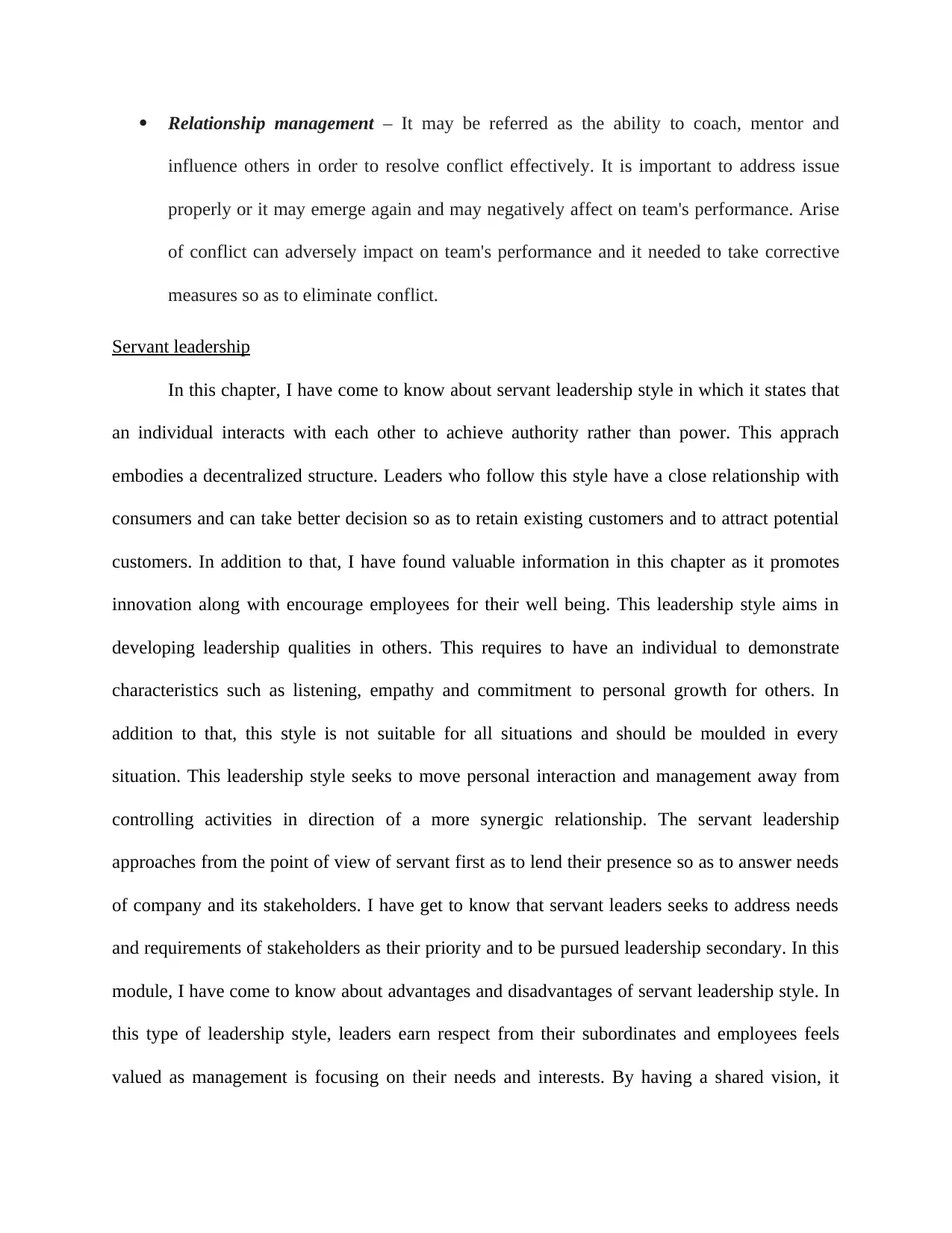
Relationship management – It may be referred as the ability to coach, mentor and
influence others in order to resolve conflict effectively. It is important to address issue
properly or it may emerge again and may negatively affect on team's performance. Arise
of conflict can adversely impact on team's performance and it needed to take corrective
measures so as to eliminate conflict.
Servant leadership
In this chapter, I have come to know about servant leadership style in which it states that
an individual interacts with each other to achieve authority rather than power. This apprach
embodies a decentralized structure. Leaders who follow this style have a close relationship with
consumers and can take better decision so as to retain existing customers and to attract potential
customers. In addition to that, I have found valuable information in this chapter as it promotes
innovation along with encourage employees for their well being. This leadership style aims in
developing leadership qualities in others. This requires to have an individual to demonstrate
characteristics such as listening, empathy and commitment to personal growth for others. In
addition to that, this style is not suitable for all situations and should be moulded in every
situation. This leadership style seeks to move personal interaction and management away from
controlling activities in direction of a more synergic relationship. The servant leadership
approaches from the point of view of servant first as to lend their presence so as to answer needs
of company and its stakeholders. I have get to know that servant leaders seeks to address needs
and requirements of stakeholders as their priority and to be pursued leadership secondary. In this
module, I have come to know about advantages and disadvantages of servant leadership style. In
this type of leadership style, leaders earn respect from their subordinates and employees feels
valued as management is focusing on their needs and interests. By having a shared vision, it
influence others in order to resolve conflict effectively. It is important to address issue
properly or it may emerge again and may negatively affect on team's performance. Arise
of conflict can adversely impact on team's performance and it needed to take corrective
measures so as to eliminate conflict.
Servant leadership
In this chapter, I have come to know about servant leadership style in which it states that
an individual interacts with each other to achieve authority rather than power. This apprach
embodies a decentralized structure. Leaders who follow this style have a close relationship with
consumers and can take better decision so as to retain existing customers and to attract potential
customers. In addition to that, I have found valuable information in this chapter as it promotes
innovation along with encourage employees for their well being. This leadership style aims in
developing leadership qualities in others. This requires to have an individual to demonstrate
characteristics such as listening, empathy and commitment to personal growth for others. In
addition to that, this style is not suitable for all situations and should be moulded in every
situation. This leadership style seeks to move personal interaction and management away from
controlling activities in direction of a more synergic relationship. The servant leadership
approaches from the point of view of servant first as to lend their presence so as to answer needs
of company and its stakeholders. I have get to know that servant leaders seeks to address needs
and requirements of stakeholders as their priority and to be pursued leadership secondary. In this
module, I have come to know about advantages and disadvantages of servant leadership style. In
this type of leadership style, leaders earn respect from their subordinates and employees feels
valued as management is focusing on their needs and interests. By having a shared vision, it
Paraphrase This Document
Need a fresh take? Get an instant paraphrase of this document with our AI Paraphraser
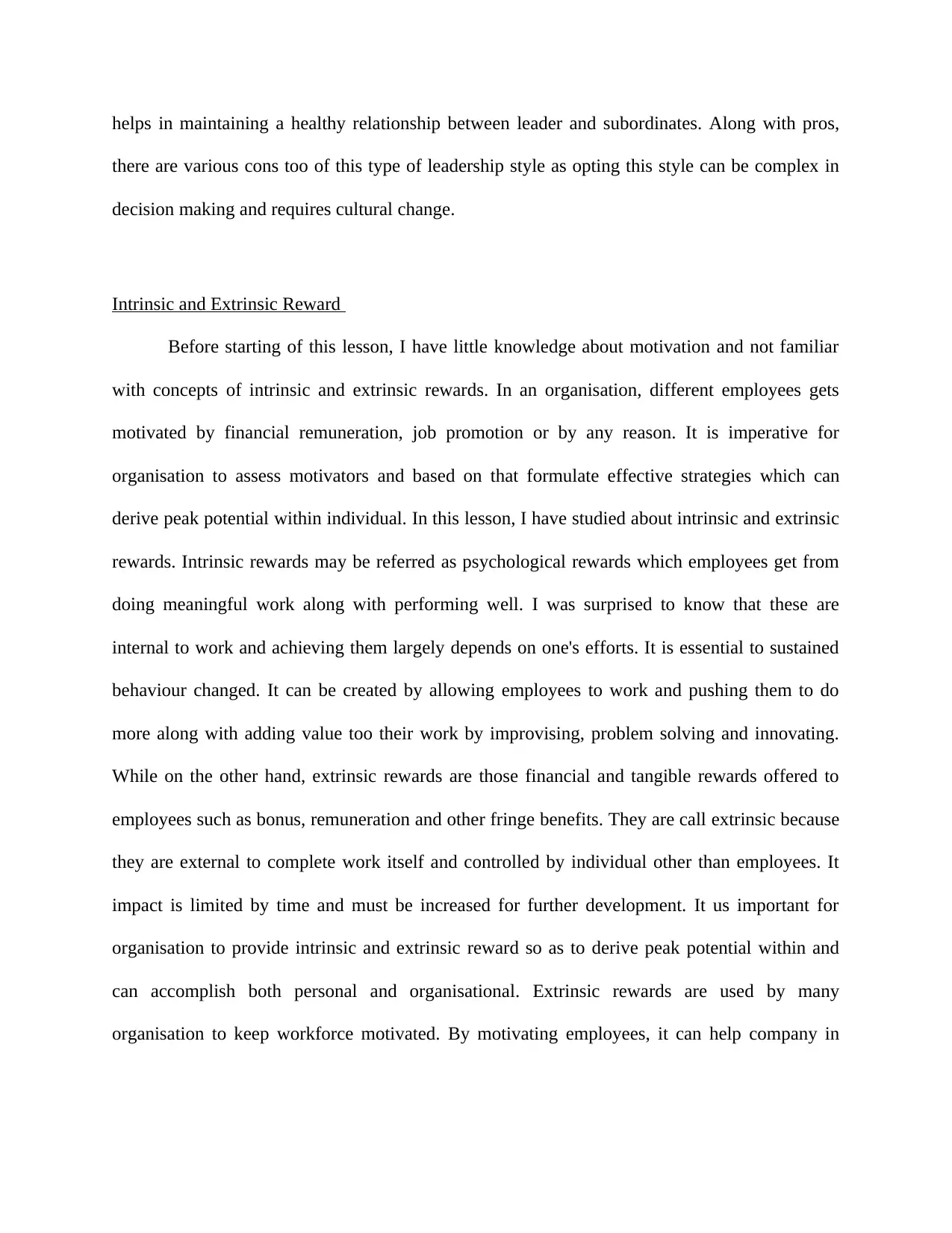
helps in maintaining a healthy relationship between leader and subordinates. Along with pros,
there are various cons too of this type of leadership style as opting this style can be complex in
decision making and requires cultural change.
Intrinsic and Extrinsic Reward
Before starting of this lesson, I have little knowledge about motivation and not familiar
with concepts of intrinsic and extrinsic rewards. In an organisation, different employees gets
motivated by financial remuneration, job promotion or by any reason. It is imperative for
organisation to assess motivators and based on that formulate effective strategies which can
derive peak potential within individual. In this lesson, I have studied about intrinsic and extrinsic
rewards. Intrinsic rewards may be referred as psychological rewards which employees get from
doing meaningful work along with performing well. I was surprised to know that these are
internal to work and achieving them largely depends on one's efforts. It is essential to sustained
behaviour changed. It can be created by allowing employees to work and pushing them to do
more along with adding value too their work by improvising, problem solving and innovating.
While on the other hand, extrinsic rewards are those financial and tangible rewards offered to
employees such as bonus, remuneration and other fringe benefits. They are call extrinsic because
they are external to complete work itself and controlled by individual other than employees. It
impact is limited by time and must be increased for further development. It us important for
organisation to provide intrinsic and extrinsic reward so as to derive peak potential within and
can accomplish both personal and organisational. Extrinsic rewards are used by many
organisation to keep workforce motivated. By motivating employees, it can help company in
there are various cons too of this type of leadership style as opting this style can be complex in
decision making and requires cultural change.
Intrinsic and Extrinsic Reward
Before starting of this lesson, I have little knowledge about motivation and not familiar
with concepts of intrinsic and extrinsic rewards. In an organisation, different employees gets
motivated by financial remuneration, job promotion or by any reason. It is imperative for
organisation to assess motivators and based on that formulate effective strategies which can
derive peak potential within individual. In this lesson, I have studied about intrinsic and extrinsic
rewards. Intrinsic rewards may be referred as psychological rewards which employees get from
doing meaningful work along with performing well. I was surprised to know that these are
internal to work and achieving them largely depends on one's efforts. It is essential to sustained
behaviour changed. It can be created by allowing employees to work and pushing them to do
more along with adding value too their work by improvising, problem solving and innovating.
While on the other hand, extrinsic rewards are those financial and tangible rewards offered to
employees such as bonus, remuneration and other fringe benefits. They are call extrinsic because
they are external to complete work itself and controlled by individual other than employees. It
impact is limited by time and must be increased for further development. It us important for
organisation to provide intrinsic and extrinsic reward so as to derive peak potential within and
can accomplish both personal and organisational. Extrinsic rewards are used by many
organisation to keep workforce motivated. By motivating employees, it can help company in
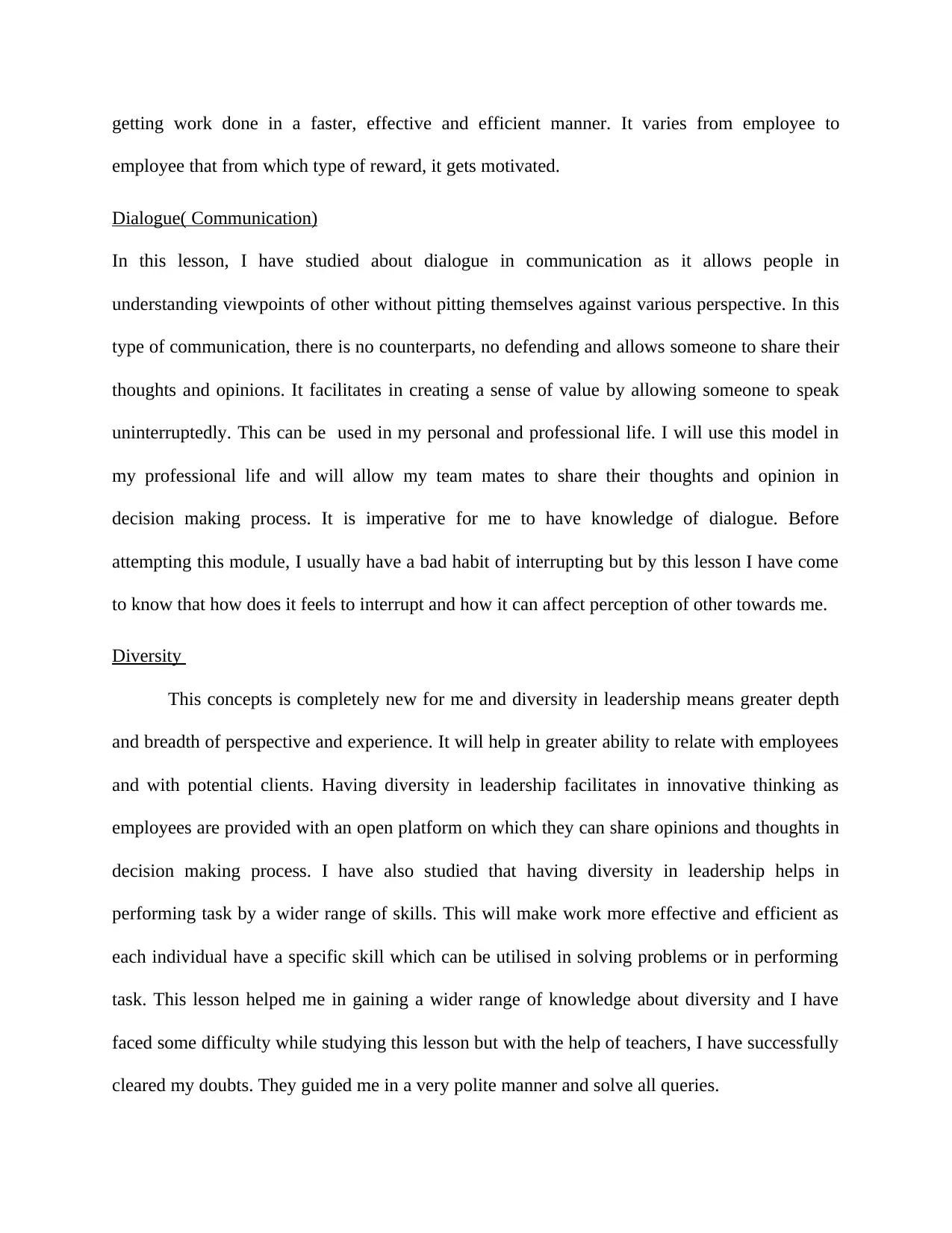
getting work done in a faster, effective and efficient manner. It varies from employee to
employee that from which type of reward, it gets motivated.
Dialogue( Communication)
In this lesson, I have studied about dialogue in communication as it allows people in
understanding viewpoints of other without pitting themselves against various perspective. In this
type of communication, there is no counterparts, no defending and allows someone to share their
thoughts and opinions. It facilitates in creating a sense of value by allowing someone to speak
uninterruptedly. This can be used in my personal and professional life. I will use this model in
my professional life and will allow my team mates to share their thoughts and opinion in
decision making process. It is imperative for me to have knowledge of dialogue. Before
attempting this module, I usually have a bad habit of interrupting but by this lesson I have come
to know that how does it feels to interrupt and how it can affect perception of other towards me.
Diversity
This concepts is completely new for me and diversity in leadership means greater depth
and breadth of perspective and experience. It will help in greater ability to relate with employees
and with potential clients. Having diversity in leadership facilitates in innovative thinking as
employees are provided with an open platform on which they can share opinions and thoughts in
decision making process. I have also studied that having diversity in leadership helps in
performing task by a wider range of skills. This will make work more effective and efficient as
each individual have a specific skill which can be utilised in solving problems or in performing
task. This lesson helped me in gaining a wider range of knowledge about diversity and I have
faced some difficulty while studying this lesson but with the help of teachers, I have successfully
cleared my doubts. They guided me in a very polite manner and solve all queries.
employee that from which type of reward, it gets motivated.
Dialogue( Communication)
In this lesson, I have studied about dialogue in communication as it allows people in
understanding viewpoints of other without pitting themselves against various perspective. In this
type of communication, there is no counterparts, no defending and allows someone to share their
thoughts and opinions. It facilitates in creating a sense of value by allowing someone to speak
uninterruptedly. This can be used in my personal and professional life. I will use this model in
my professional life and will allow my team mates to share their thoughts and opinion in
decision making process. It is imperative for me to have knowledge of dialogue. Before
attempting this module, I usually have a bad habit of interrupting but by this lesson I have come
to know that how does it feels to interrupt and how it can affect perception of other towards me.
Diversity
This concepts is completely new for me and diversity in leadership means greater depth
and breadth of perspective and experience. It will help in greater ability to relate with employees
and with potential clients. Having diversity in leadership facilitates in innovative thinking as
employees are provided with an open platform on which they can share opinions and thoughts in
decision making process. I have also studied that having diversity in leadership helps in
performing task by a wider range of skills. This will make work more effective and efficient as
each individual have a specific skill which can be utilised in solving problems or in performing
task. This lesson helped me in gaining a wider range of knowledge about diversity and I have
faced some difficulty while studying this lesson but with the help of teachers, I have successfully
cleared my doubts. They guided me in a very polite manner and solve all queries.
⊘ This is a preview!⊘
Do you want full access?
Subscribe today to unlock all pages.

Trusted by 1+ million students worldwide
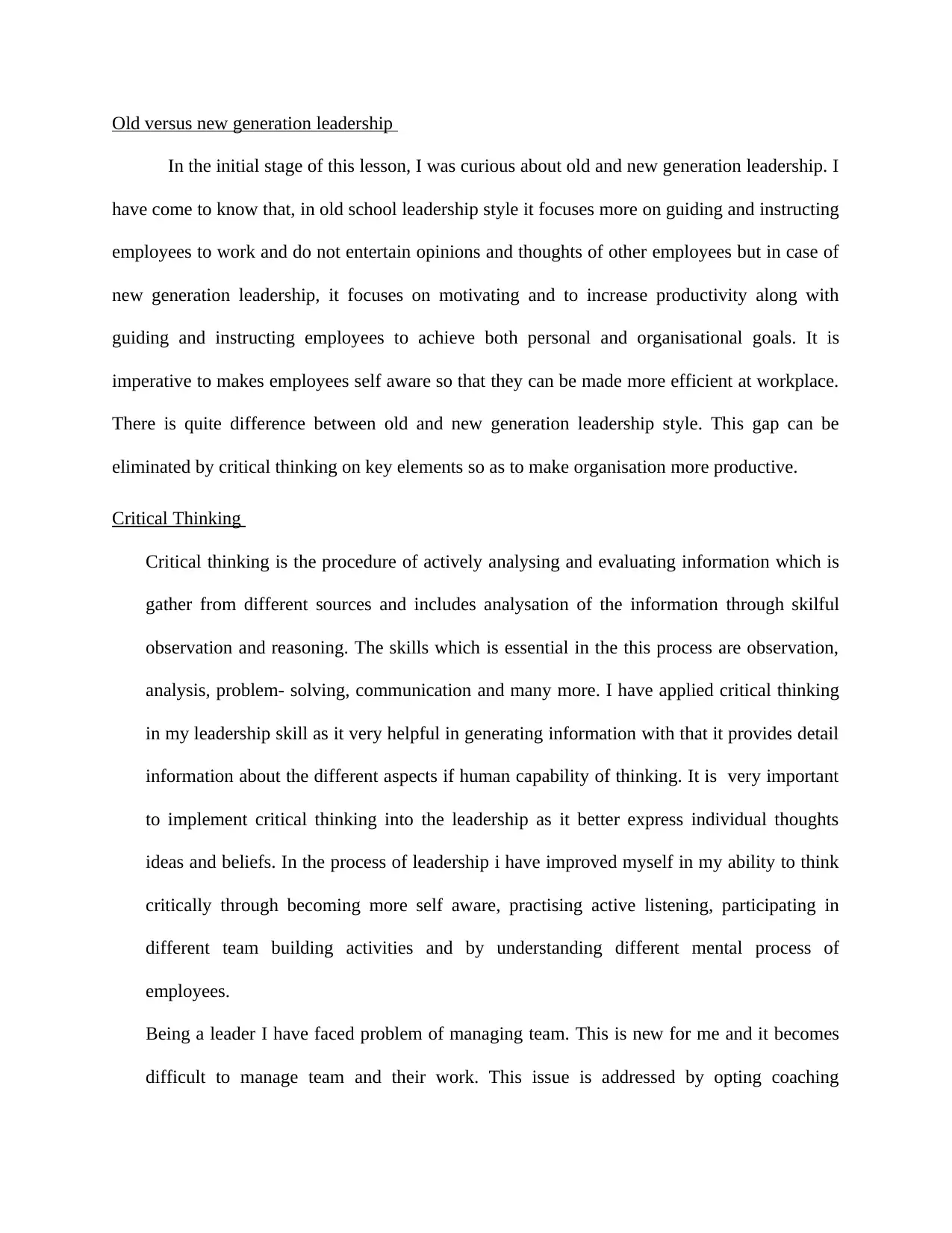
Old versus new generation leadership
In the initial stage of this lesson, I was curious about old and new generation leadership. I
have come to know that, in old school leadership style it focuses more on guiding and instructing
employees to work and do not entertain opinions and thoughts of other employees but in case of
new generation leadership, it focuses on motivating and to increase productivity along with
guiding and instructing employees to achieve both personal and organisational goals. It is
imperative to makes employees self aware so that they can be made more efficient at workplace.
There is quite difference between old and new generation leadership style. This gap can be
eliminated by critical thinking on key elements so as to make organisation more productive.
Critical Thinking
Critical thinking is the procedure of actively analysing and evaluating information which is
gather from different sources and includes analysation of the information through skilful
observation and reasoning. The skills which is essential in the this process are observation,
analysis, problem- solving, communication and many more. I have applied critical thinking
in my leadership skill as it very helpful in generating information with that it provides detail
information about the different aspects if human capability of thinking. It is very important
to implement critical thinking into the leadership as it better express individual thoughts
ideas and beliefs. In the process of leadership i have improved myself in my ability to think
critically through becoming more self aware, practising active listening, participating in
different team building activities and by understanding different mental process of
employees.
Being a leader I have faced problem of managing team. This is new for me and it becomes
difficult to manage team and their work. This issue is addressed by opting coaching
In the initial stage of this lesson, I was curious about old and new generation leadership. I
have come to know that, in old school leadership style it focuses more on guiding and instructing
employees to work and do not entertain opinions and thoughts of other employees but in case of
new generation leadership, it focuses on motivating and to increase productivity along with
guiding and instructing employees to achieve both personal and organisational goals. It is
imperative to makes employees self aware so that they can be made more efficient at workplace.
There is quite difference between old and new generation leadership style. This gap can be
eliminated by critical thinking on key elements so as to make organisation more productive.
Critical Thinking
Critical thinking is the procedure of actively analysing and evaluating information which is
gather from different sources and includes analysation of the information through skilful
observation and reasoning. The skills which is essential in the this process are observation,
analysis, problem- solving, communication and many more. I have applied critical thinking
in my leadership skill as it very helpful in generating information with that it provides detail
information about the different aspects if human capability of thinking. It is very important
to implement critical thinking into the leadership as it better express individual thoughts
ideas and beliefs. In the process of leadership i have improved myself in my ability to think
critically through becoming more self aware, practising active listening, participating in
different team building activities and by understanding different mental process of
employees.
Being a leader I have faced problem of managing team. This is new for me and it becomes
difficult to manage team and their work. This issue is addressed by opting coaching
Paraphrase This Document
Need a fresh take? Get an instant paraphrase of this document with our AI Paraphraser

leadership theory. By applying this theory in my work, I can effectively manage my team
and can make them more productive. I will guide and instruct team in a very polite manner
and all the above issues can be eliminated by opting this approach.
and can make them more productive. I will guide and instruct team in a very polite manner
and all the above issues can be eliminated by opting this approach.
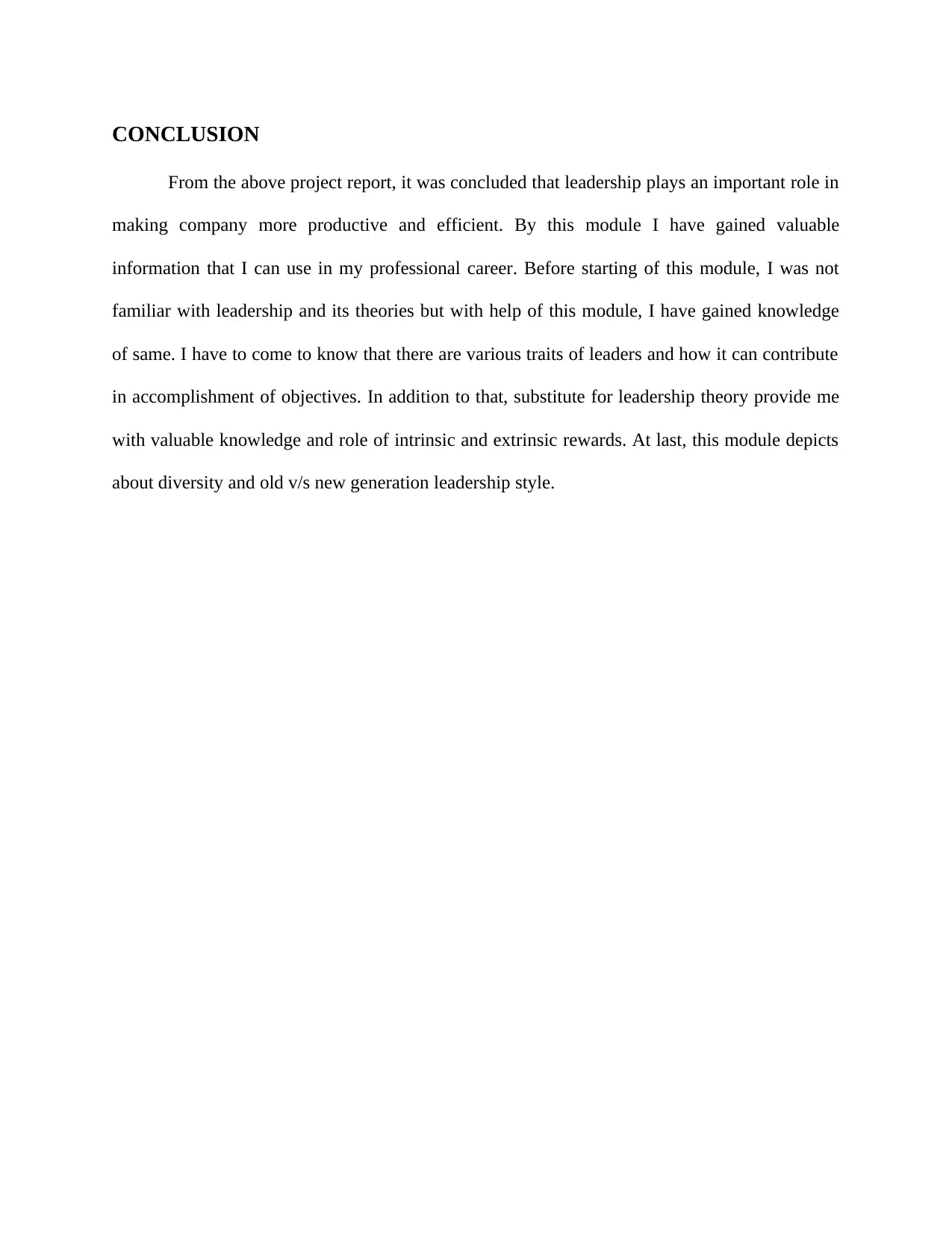
CONCLUSION
From the above project report, it was concluded that leadership plays an important role in
making company more productive and efficient. By this module I have gained valuable
information that I can use in my professional career. Before starting of this module, I was not
familiar with leadership and its theories but with help of this module, I have gained knowledge
of same. I have to come to know that there are various traits of leaders and how it can contribute
in accomplishment of objectives. In addition to that, substitute for leadership theory provide me
with valuable knowledge and role of intrinsic and extrinsic rewards. At last, this module depicts
about diversity and old v/s new generation leadership style.
From the above project report, it was concluded that leadership plays an important role in
making company more productive and efficient. By this module I have gained valuable
information that I can use in my professional career. Before starting of this module, I was not
familiar with leadership and its theories but with help of this module, I have gained knowledge
of same. I have to come to know that there are various traits of leaders and how it can contribute
in accomplishment of objectives. In addition to that, substitute for leadership theory provide me
with valuable knowledge and role of intrinsic and extrinsic rewards. At last, this module depicts
about diversity and old v/s new generation leadership style.
⊘ This is a preview!⊘
Do you want full access?
Subscribe today to unlock all pages.

Trusted by 1+ million students worldwide
1 out of 13
Related Documents
Your All-in-One AI-Powered Toolkit for Academic Success.
+13062052269
info@desklib.com
Available 24*7 on WhatsApp / Email
![[object Object]](/_next/static/media/star-bottom.7253800d.svg)
Unlock your academic potential
Copyright © 2020–2026 A2Z Services. All Rights Reserved. Developed and managed by ZUCOL.





